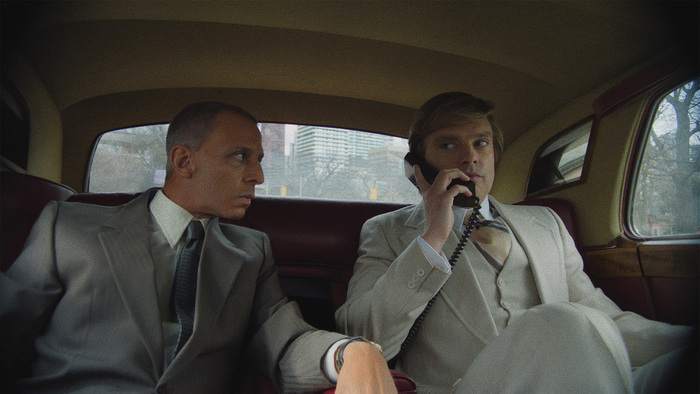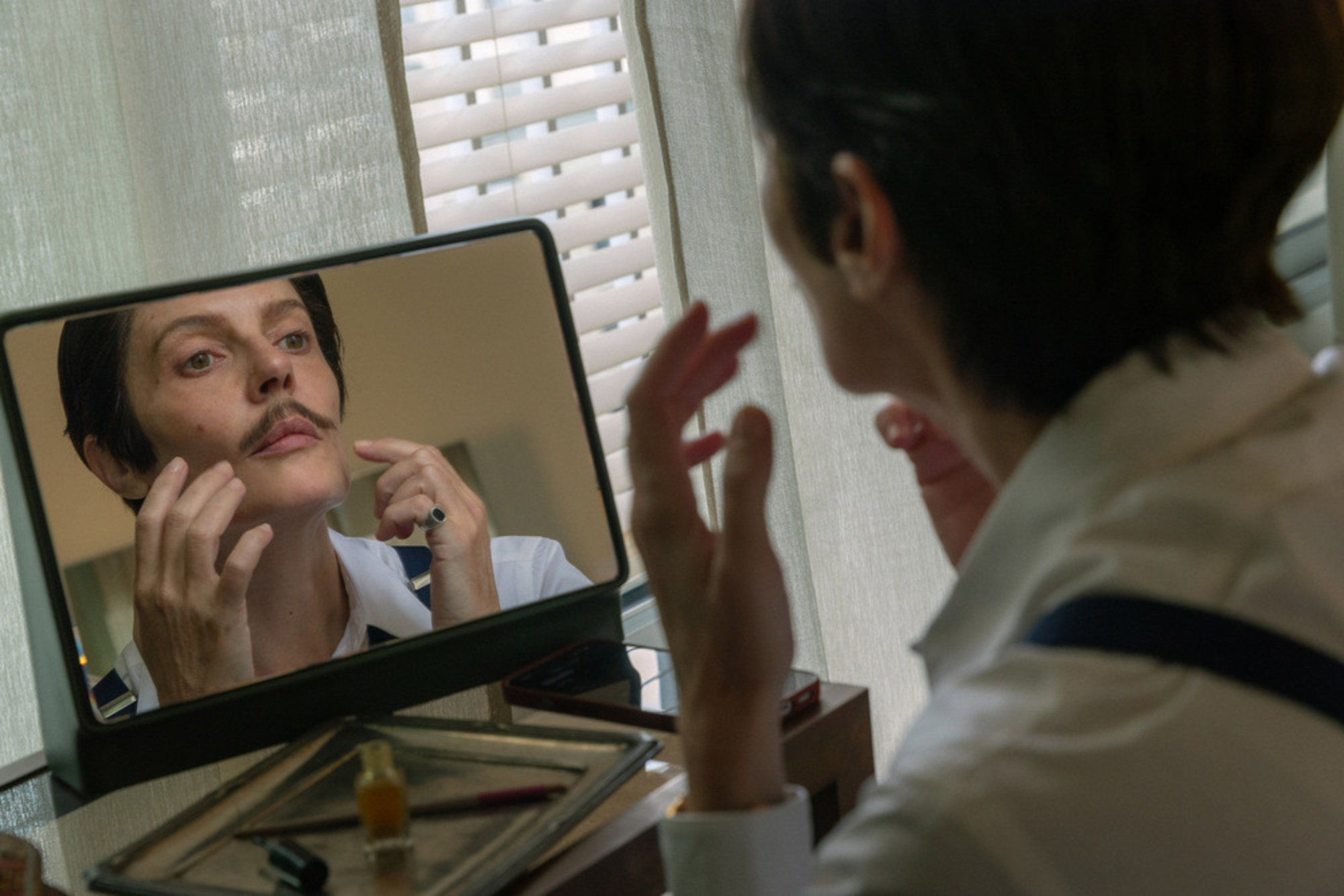
In the high shadow of the mountains, Colorado Avenue came alive this Memorial Day weekend for the 51st edition of the beloved Telluride Film Festival. The festival has changed, and it hasn’t. Decorations from the 1970s are dusted off as digital projectors whir to life. New hands are touching up decades of paint under the direction of familiar faces. Though the festival has faced losses and challenges, such as the COVID-19 pandemic and the historic SAG-AFTRA strikes last year, each iteration brings fresh movies, eager audiences, and dedicated staff working to bring the magic back to life. This year’s Telluride Film Festival was no different.
- The Dogs: Building Telluride by Hand
- Major Premieres
- Conclave, by Edward Berger
- The Piano Lesson, by Malcolm Washington
- Saturday Night, by Jason Reitman
- The Friend, by Scott McGehee and David Siegel
- Nickel Boys, by RaMell Ross
- Zurawski v Texas, by Maisie Crow and Abbie Perrault
- Repertory Love
- Handmade Magic
The Dogs: Building Telluride by Hand
Like many film festivals of its caliber, Telluride can pose a significant financial barrier to entry. To make it back to the magic, this author took Barry Jenkins‘ advice from the previous year, when he personally encouraged members of the 2023 Student Symposium to apply to return as dogs (note: this title is a shortened version of the “Vespucci Dogs,” the nickname given to the Telluride Film Festival’s Production Apprentices).
The Telluride Film Festival Production Apprenticeship is unique. For four to six weeks, an eclectic group of film enthusiasts transforms school gyms and ice rinks into cinemas, preparing this quaint ski town for one of the most prestigious film festivals in the United States. It’s grueling work, but it pays off when the house lights dim in a hand-built cinema. More than anything, the apprenticeship is an unforgettable bonding experience. Through cold plunges in the river, homemade grilled cheeses, countless rounds of Catan, and hours of dancing to local DJ sets, the 2024 Telluride Dogs built as many cinemas as we did lifelong friendships.
Though the cinemas come down and the projectors turn off, 51 years of memories remain, waiting for next year’s festival.
Major Premieres
Each year, the festival highlights the work of a few living artists to celebrate their contributions to film. The 2024 Silver Medallion recipients included actress Saoirse Ronan, director Jacques Audiard, and film editor Thelma Schoonmaker. Presentation ceremonies and special programming of their work dotted the colorful festival schedule. With nearly sixty films playing over four days, catching everything at this festival is impossible. The most eagerly anticipated screenings are often world premieres, debuting to an eager Telluride audience.
Conclave, by Edward Berger
Edward Berger‘s political mystery-thriller Conclave features a characteristically riveting performance by Ralph Fiennes, who leads a star-studded ensemble: Stanley Tucci, John Lithgow, Sergio Castellitto and Isabella Rossellini, among others. In the beautiful confines of Vatican City, Cardinal Thomas Lawrence (Fiennes) must oversee the election of the next Pope. Based on the eponymous 2016 novel by Robert Harris, it’s a timely and surprisingly comedic political allegory in the face of election season, with a refreshing stance on faith and organized religion.
The Piano Lesson, by Malcolm Washington
The Piano Lesson, Malcolm Washington‘s directorial debut, is an imaginative and haunting adaptation of August Wilson‘s 1987 play about generational trauma, inheritance, and the legacy of slavery. Produced by his father, Denzel Washington, and starring his brother, John David Washington, The Piano Lesson centers on a Great Depression-era family at odds over the heirloom piano carved by their enslaved ancestor. Malcolm Washington has been widely praised for his creativity in translating this celebrated story from stage to screen, making this the second August Wilson play to be adapted by a Washington, following his father’s work on Fences (2016).
Saturday Night, by Jason Reitman
Saturday Night wowed Telluride audiences, who waited in some of the longest lines of the festival to see Jason Reitman‘s love letter to Saturday Night Live. In a Q&A, Reitman shared his experiences writing for SNL and the “lightning in a bottle” feeling of the hours leading up to showtime. For this movie, he conducted extensive research among living comedians to turn back the clock to the very first, very chaotic night of the show that changed American comedy forever.
The Friend, by Scott McGehee and David Siegel
Based on the 2018 novel by Sigrid Nunez, directed by Scott McGehee and David Siegel, The Friend stars Naomi Watts, Bill Murray, and a giant Great Dane in a sweet animal-companion story about navigating grief. When a writer’s friend and mentor dies, she’s forced to inherit his dog in the fast-paced and uncompromising reality of New York City. Bing, the Great Dane, greeted Telluride festival-goers on Colorado Ave over the weekend, making a wonderful follow-up to last year’s Messi from Anatomy of a Fall.
Nickel Boys, by RaMell Ross
Nickel Boys, the highly anticipated adaptation of the Pulitzer Prize-winning novel by Colson Whitehead, builds on the language of its source material under the direction of RaMell Ross, the documentarian behind the Oscar-nominated documentary Hale County This Morning, This Evening. Ross boldly invites viewers into Elwood’s story of survival at Nickel Academy, the abusive juvenile reformatory in the Jim Crow-era South, with experimental cinematography that reinforces Nickel Boys as urgent and universal.
Zurawski v Texas, by Maisie Crow and Abbie Perrault
Maisie Crow and Abbie Perrault‘s Zurawski v Texas is another urgent movie. A documentary that follows three Texas women denied medically necessary abortions. Fighting alongside Center for Reproductive Rights Senior Staff Attorney Molly Duane all the way to the Texas Supreme Court, Zurawski v Texas shows the very real horrors of being pregnant in a state that has banned abortion since Roe v Wade was overturned. With abortion access on the ballot in many states, the documentary, produced by Jennifer Lawrence as well as Chelsea and Hillary Clinton, is a galvanizing and grassroots rallying cry to vote.
Non-premiere fan favorites included Jacques Audiard‘s star-studded musical Emilia Pérez, Sean Baker‘s riotously entertaining rags-to-riches tale Anora, and Mohammad Rasoulof‘s pulse-pounding epic The Seed of the Sacred Fig. The Apprentice, Ali Abbasi‘s Cannes-premiering satire, and Jesse Eisenberg‘s A Real Pain also delighted Telluride audiences as sneak screenings.
Repertory Love
Telluride has a long tradition of celebrating old and new titles, making it a favorite festival for cinephiles. In addition to the new films, guest programmer Kenneth Lonergan shed light on several repertory titles. Lonergan, the writer and director of Manchester by the Sea, highlighted Lewis Milestone‘s Arch of Triumph (1948), Stanley Kubrick‘s Barry Lyndon (1975), David Lean‘s Doctor Zhivago (1965), Edmund Goulding‘s Grand Hotel (1932), and John Ford‘s My Darling Clementine (1946).
Both Arch of Triumph and the accompanying special screening of Arthur Crabtree‘s Hindle Wakes (1952) had the rare distinction of being shown as 35mm film prints. Telluride is one of the few festivals dedicated to the projection of film, an increasingly endangered practice. Though a few independent cinemas in the United States retain the ability to project physical film, many venues switched entirely to digital projection in the early 2000s. Therefore, film projection’s survival is a pressing issue in the film industry as the necessary resources and skilled talent dwindle.
“When you watch film, you spend half of your time in the dark as the shutter opens and closes 24 times per second. It’s an active process for the brain as it tries to make sense of what it’s seeing. It’s why you often rub your eyes from the strain as you leave a film show,” explains Jones. “Digital content, on the other hand, uses scan lines to replace a previous image with a new one and never goes dark. It has a numbing effect on the brain, which is why you’re more likely to zone out and fall asleep when watching TV on your couch.” Jones believes that by returning film to theatres, “audiences can again enjoy the active process it used to be – nowadays there’s very few opportunities for the general public to do that.”
Adam Witmer, by Melissa Upton-Julio
So the programming of Hindle Wakes, on loan from the collection of the BFI National Archive, and Arch of Triumph, a restoration print on loan from the UCLA Film & Television Archive, represents an admirable commitment to this highly skilled art form and the team of projectionists at Telluride. With physical media on the rise among Generation Z, there’s hope for a concentrated resurgence of film projection.
Handmade Magic
In the tension of this election year, Telluride’s programming conveyed a necessary sense of moral urgency; within that moral urgency, hope in the community. Among Telluride’s Dogs, staff, volunteers, and projectionists, there was an obvious and unfailing commitment to the hard work to make magic happen. Even in the face of challenges, the message was clear: we will build and grow together. At the end of each festival day, the projectors whir to life, and we laugh or cry for a while as we link arms on the way home and prepare for the next day’s work.









